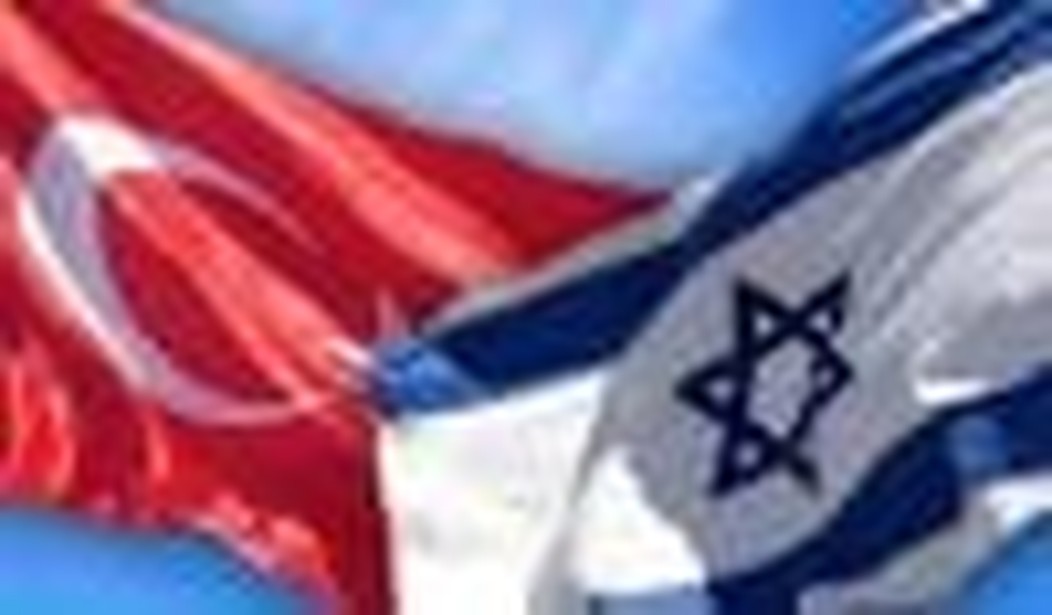On a bright, cold day in mid-January, 1998, I stood with a group of Turkish journalists at the water’s edge on Haifa Bay. A shape appeared on the horizon. It was a Turkish warship, beginning its approach to the Israeli coastline. One of the journalists handed out cigars as the ship slowly drew nearer. We toasted the friendship between Israel and Turkey — and the transformation of the Middle East’s strategic balance.
I was a young official of the Israel Prime Minister’s Office at the time. The Turkish journalists were our guests. They were in Israel to cover the Reliant Mermaid naval exercise. Reliant Mermaid, a joint maneuver involving the Israeli, Turkish, and U.S. navies, launched the strategic alliance between Turkey and Israel which formed a lynchpin of the pro-western dispensation that marked the post-Cold War Middle East.
How things have changed. Turkish navy ships may soon once again be sailing to the eastern Mediterranean. This time, however, they will do so with the real possibility of a clash with their former Israeli comrades in arms. This sentence sounds absurd even as I write it. Yet it is accurate. What has transformed these friends into enemies?
Profound changes are under way in the Middle East. In recent years, the key strategic process in the region was a Cold War-type system, placing the U.S. and its regional allies in a contest with a rival alliance led by the Islamic Republic of Iran.
The series of upheavals known as the “Arab Spring,” however, have cut across this picture, weakening both the rival sides. The United States lost a key lynchpin of its alliance with the fall of the Mubarak regime in Egypt.
Iran, contrary to its early expectations, has not yet been able to successfully take advantage of the travails of its enemies. The uprising in Syria and Tehran’s determination to preserve the dictator Bashar al-Assad at all costs have left Iran with the image of an oppressive, alien power supporting violence against Sunni Muslim Arabs.
The weakening of both the U.S.- and Iranian-led regional alliances has left a power vacuum into which Erdogan’s Turkey is now trying to step. Ankara used to pride itself on its “zero problems with neighbors” policy. Today, under the leadership of the Islamist AKP, Turkey is simultaneously picking fights with a long array of enemies, while trying to propose itself as a candidate for the leadership of the region.
Thus, Ankara is playing the key role behind the scenes in aiding and organizing the Sunni opposition in Syria. It has in recent days been enthusiastically bombing Kurdish targets in northern Iraq (with the loss of a number of civilian lives). It is threatening Cyprus against beginning to drill for gas in its own territorial waters.
The clash with Israel, however, forms the centerpiece. This is not simply another item on the list of disputes. Opposition to the Jewish state remains the commanding political passion for millions across the Arabic-speaking and broader Muslim world. Turkey has for the last year been engaged in launching a bid for the ownership of the Palestinian cause, knowing it represents the path to popularity in the eyes of the region’s masses, and therefore influence over their rulers.
Turkey’s move toward enmity with Israel is also encapsulated in the image of a ship heading toward Israeli waters. This ship, the Mavi Marmara, carried Islamist activists of the IHH organization, as part of the naval flotilla to Hamas-controlled Gaza, in May 2010. Israel’s killing of nine of them, as they resisted the boarding of their ship, was the moment when the die was cast. Since then, Israel’s relationship with Turkey has been in free fall.
Events are moving fast. The Turkish prime minister was in recent days met by wildly enthusiastic crowds in chaotic Egypt. They chanted “Erdogan! Erdogan! A real Muslim and not a coward,” named him “the new Salah al-Din,” and called for joint Turkish and Egyptian action to end the naval blockade on Gaza.
The media is full of rumors that three Turkish frigates are set to be dispatched to the Mediterranean. Some unconfirmed reports even suggest that they will be authorized to clash with Israeli vessels if aid ships are intercepted in international waters.
We have come a long way from Reliant Mermaid, via the Mavi Marmara, to the prospect of Israeli-Turkish naval clashes. With the region in flux, a new Turkey is looking eastwards. Israel will do all it can to repair relations, but will stand in the defense of its vital interests — as it did in May 2010, and as it has always done.
It will be many years before Turkish sailors, journalists, and officials can toast their Israeli counterparts in friendship again by the blue waters of Haifa Bay. All is changed, changed utterly, as an Irish poet once wrote.
Strange and tumultuous days.








Join the conversation as a VIP Member